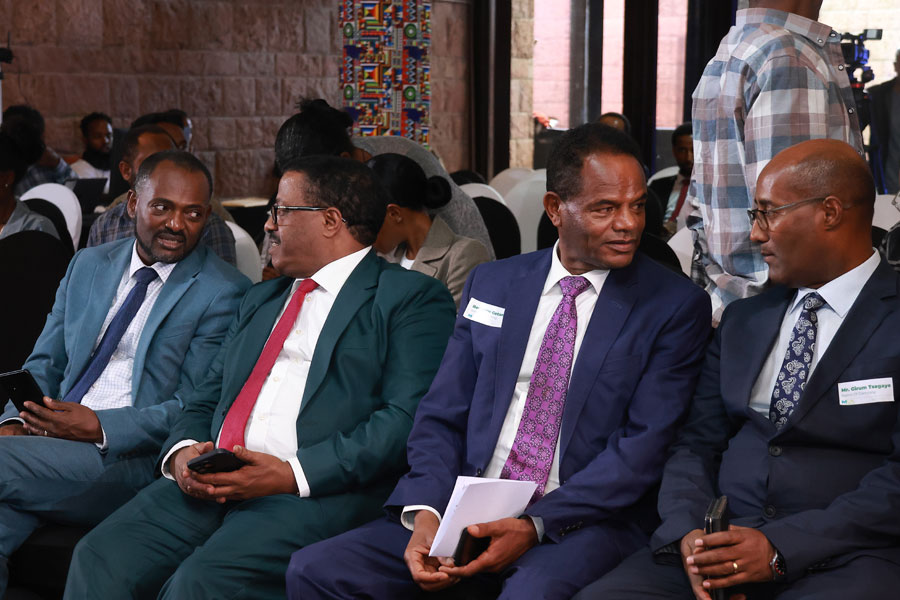
Commentaries | Feb 12,2022
Apr 20 , 2019
By Eden Sahle
Eden Sahle is founder and CEO of Yada Technology Plc. She has studied law with a focus on international economic law. She can be reached at edensah2000@gmail.com.
Last Monday, a handful of fellow African businesswomen and I were granted the opportunity to sit down with Ivanka Trump, daughter and advisor to United States President Donald Trump. She had come to Ethiopia as part of her Women's Global Development & Prosperity (W-GDP), which aims to empower woman economically. It is only fitting that Ethiopia was the first place she visited as part of the programme.
Starting a business in Ethiopia is no walk in the park, forcing many to give up prematurely. There are financial difficulties, not to mention licensing and market hurdles. The agony of leading a start-up with no access to funds and a lack of skilled labour to sustain the business is close to unbearable for those that have dared to give it a chance.
One of the biggest headaches for any entrepreneur involves getting credit. It is often tough to raise enough capital to start a company. Even long after the business is established, owners struggle to obtain loans as banks set high eligibility requirements for business owners.
The absence of access to loans from very demanding banks constrains the ability to found and build a successful business. Banking relationships are supposed to create not just saving but also credit that is consequential to any economy. Inadequate access to credit can cripple the formation of businesses, hampering economic and then social development. Lack of access from formal financial services also forces individuals to turn to the informal sector.
To any new owner of a start-up, it is working long hours or holding business meetings on holidays that is frustrating, but the horror is losing all that hard work due to a lack of cash flow.
In the era of entrepreneurship, where more and more people are realising their dreams of owning and bringing to life their own ideas, capital is everything. The success of any business depends on cash flow and persistence to sustainably keep it running.
What puts insult to injury is that women are less likely to be in a position to get financing as institutions and society have stacked the cards against us. Men do not have it easy accessing credit, but women have it even worse in having their capability to take risks in business and succeed questioned at every turn.
This has robbed many female entrepreneurs from becoming innovators. Evidently, younger women struggle the most. The financing gap for women in Sub-Saharan Africa is estimated to be a staggering 20 billion dollars, according to the African Development Bank.
Women represent more than half of the 1.2 billion African population. Ignoring these forces will only prove economic failure for any country on the continent, and Ethiopia is no exception.
In the absence of a solid base from which women can access loans, the W-DGP project, which sets the ambitious target of reaching 50 million women in developing countries, shines a light on the bleak situation. For now, this much-anticipated W-DGP appears to be making a mark for Sara Abera, founder of the 16-year-old textile company Muya, who inked a letter of interest at the symposium.
To create more access for the majority, local development policies should place more emphasis on credit. Banks should be focused on matters that can amplify businesses to support lucrative ideas. Addressing these problems will close gaps between well-established businesses that have access to loans and those start-ups that often do not have access to loans.
When businesses are strong, so is the economy. A successful private sector, thriving with innovations and more job creation, is what Ethiopia desperately neeks. Having an evolving banking relationship with businesses, including start-ups, can boost the Ethiopian business sector, which is currently progressing at a snail’s pace. It is in the hands of financial institutions to come up with a game-changing plan to transform the Ethiopian private sector.
PUBLISHED ON
Apr 20,2019 [ VOL
20 , NO
990]

Commentaries | Feb 12,2022

Fortune News | Mar 09,2024

Radar | Mar 07,2020

Radar | Oct 16,2021

Radar | Feb 04,2023

My Opinion | 131983 Views | Aug 14,2021

My Opinion | 128371 Views | Aug 21,2021

My Opinion | 126309 Views | Sep 10,2021

My Opinion | 123927 Views | Aug 07,2021

Dec 22 , 2024 . By TIZITA SHEWAFERAW
Charged with transforming colossal state-owned enterprises into modern and competitiv...

Aug 18 , 2024 . By AKSAH ITALO
Although predictable Yonas Zerihun's job in the ride-hailing service is not immune to...

Jul 28 , 2024 . By TIZITA SHEWAFERAW
Unhabitual, perhaps too many, Samuel Gebreyohannes, 38, used to occasionally enjoy a couple of beers at breakfast. However, he recently swit...

Jul 13 , 2024 . By AKSAH ITALO
Investors who rely on tractors, trucks, and field vehicles for commuting, transporting commodities, and f...

Jul 5 , 2025
Six years ago, Ethiopia was the darling of international liberal commentators. A year...

Jun 28 , 2025
Meseret Damtie, the assertive auditor general, has never been shy about naming names...

Jun 21 , 2025
A well-worn adage says, “Budget is not destiny, but it is direction.” Examining t...

Jun 14 , 2025
Yet again, the Horn of Africa is bracing for trouble. A region already frayed by wars...

Jul 6 , 2025 . By BEZAWIT HULUAGER
The federal legislature gave Prime Minister Abiy Ahmed (PhD) what he wanted: a 1.9 tr...

Jul 6 , 2025 . By YITBAREK GETACHEW
In a city rising skyward at breakneck speed, a reckoning has arrived. Authorities in...

Jul 6 , 2025 . By NAHOM AYELE
A landmark directive from the Ministry of Finance signals a paradigm shift in the cou...

Jul 6 , 2025 . By NAHOM AYELE
Awash Bank has announced plans to establish a dedicated investment banking subsidiary...